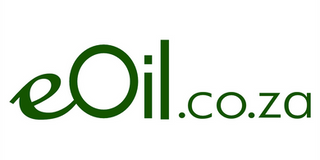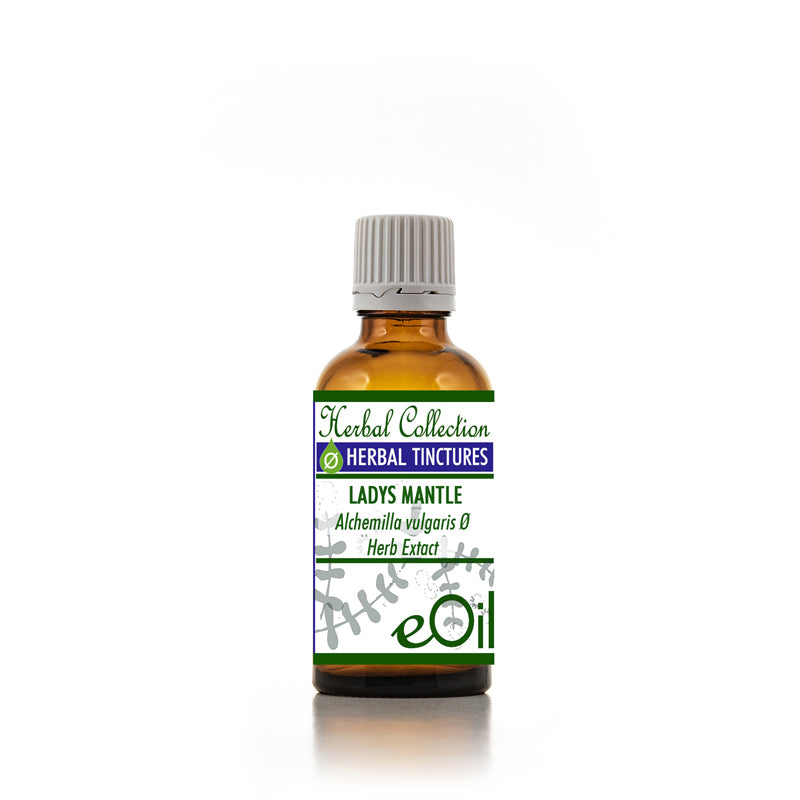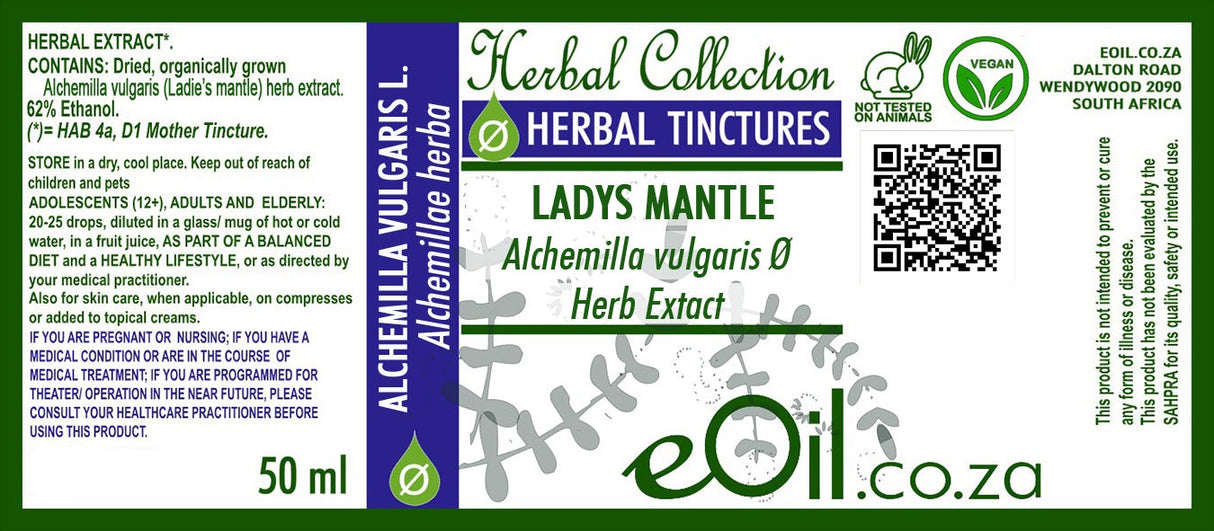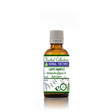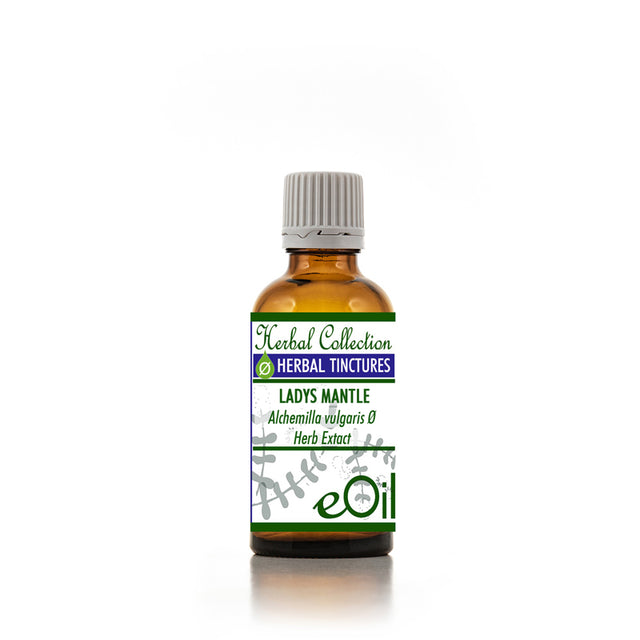Lady's mantle - Liquid Herbal Extract
Lady's mantle - Liquid Herbal Extract - 50 ML is backordered and will ship as soon as it is back in stock.
Description
Description
Understanding Mother Tinctures & Glycerines
Lady’s Mantle Liquid Herbal Extract tincture is made from Alchemilla vulgaris, a perennial herb valued for its natural tannins, flavonoids, and astringent plant compounds.
This tincture uses the aerial parts to preserve key botanical actives.
Commonly added to daily wellness routines for broad support of vitality and comfort, it is suitable for adults.
Not for use during pregnancy.
TRADITIONALLY USED FOR
May help with
Lady’s Mantle Liquid Herbal Extract Tincture (Alchemilla vulgaris) | Menstrual, Menopausal & Tissue Tonic | eOil.co.za
Lady’s Mantle—nature’s classic “women’s herb”—is a gentle, astringent, and toning botanical celebrated for centuries across Europe for its support of menstrual balance, hormonal harmony, and tissue repair.
This fast-acting tincture is made from pure aerial parts, preserving the full spectrum of plant actives for holistic, rapid effect.
Key Benefits
Menstrual Comfort & Hormone Balance: Renowned for easing heavy, painful, or irregular menstruation, Lady’s Mantle helps restore a healthy cycle, moderate PMS and cramps, and supports smoother transitions during perimenopause or menopause.
Uterine & Pelvic Vitality: Tones uterine and pelvic tissues, helping with prolapse, postpartum recovery, or atony, and a traditional favorite in managing mild fibroids, endometriosis, and fertility issues of unknown cause.
Astringent Support for Bleeding & Flow: Useful for excessive flow, vaginal discharge, and wound healing—internally or as a local rinse—thanks to high tannin and flavonoid content.
Antioxidant & Anti-Inflammatory: Rich in flavonoids and phenolics, Lady’s Mantle soothes tissue inflammation, protects cells, and supports wound healing inside and out1.
Digestion & Gut Health: Traditional relief for mild diarrhea, a weak digestive tract, or ‘flaccid’ mucous membranes, also calming to gut upset around periods.
Skin & Mucosa Repair: Gentle but powerful tissue healer for postpartum perineal tissue, inflamed gums, minor rash, or rectal/anal injury.
Directions for Use
Adults: Take 2–4 ml (approx. 40–80 drops) in water, 1–3 times daily.
Use in the second half of your cycle (ovulation to menses) for hormonal balance. For acute support, use up to 5 ml 2–3x daily under direction.
n be diluted for use as a vaginal or wound rinse.
Not for children or use in pregnancy without a practitioner’s advice.
Cautions & Contraindications
Avoid use in early pregnancy; safety not established.
Use caution if taking oral medications—high tannin content may reduce their absorption; take Lady’s Mantle at least 1 hour apart from medications.
Rarely may cause GI upset or skin sensitivity. Stop use if rash, headache, or persistent discomfort occurs.
Not a substitute for medical care in severe bleeding, infection, or hormone-dependent disease—consult your practitioner first.
Storage
Store sealed, away from heat, sunlight, and child access.
Disclaimer
This product is not intended to diagnose, treat, cure, or prevent any disease. Always consult a qualified health professional before use, especially alongside medication or complex hormone health issues.
INFORMATION
Source : http://www.wikiphyto.org/wiki/Alchemille
Reference on http://www.wikiphyto.org
Translation in English by Google Translate (go to the page of the source linked | on Chrome cellphones go on the 3 dots on the top right and select translate in your preferred language | on laptop right click your mouse and select option translate when hoovering on the page
plant name
Lady's Mantle , Lion's Foot , Coat of Our Lady
International Latin denomination
Alchemilla glabra Neygenf. = Alchemilla vulgaris L. = Alchemilla xanthochlora Rothm.
botanical family
Rosaceae
Description and habitat
- Perennial plant 10 to 40 cm high, woods, meadows and wet pastures throughout Europe except Mediterranean area
- Leaves with 7 - 11 shallow lobes
- Small, yellowish-green flowers arranged in corymbs
- The root stump is thick, brown, almost woody
History and tradition
- Called “plant of alchemists” because of its property of maintaining dew droplets around its leaves, which improves the harvest
- It had the reputation of curing the sterility of women and even of firming up the tissues of the genital apparatus, because of its astringent properties, for women who wanted to pass themselves off as virgins, hence its nickname "cloak of the ladies”; for this purpose, we could also use alum (aluminum and potassium sulphate, very astringent) or walnut leaves very rich in tannins like those of lady's mantle
- In the translation of Dioscorides' De Materia Medica, Andres de Laguna (1570) recommends two preparations of lady's mantle:
- The root to treat internal and external wounds
- The aerial parts to treat fractures in babies and young children
Parts used
- Leaves and aerial parts
Dosage forms available
- Whole plant tincture
- Fluid extract
- Dry extract
- EPS
Usual dosages
Composition
Main components of the plant
- Tannins (6 - 8%) gallo-tannins and ellagitannins : agrimoniin and laevigatine (dimers), pedunculagin (monomer), ellagic acid , sanguiine H10, castalagin , vescalagin [1]
- Proanthocyanidols , catechin , trimeric procyanidin
- Ubiquitous flavonoids (2%), glycosides and free quercetol , kaempferol , quercetin 3-O-alpha-L-arabinopyranoside [2] , luteolin-7-O-glucoside
Main components of buds or young shoots
Main components of essential oil
Properties
Plant properties
- Astringent, anti-diarrheal
- Luteinic, clinically presents progestogenic effects, without identified active principles
- Emmenagogue
- Hemostatic and anti-haemorrhagic
- Healing, vulnerary, stimulates the multiplication of epithelial cells and myofibroblasts [3]
- Tannins are antimutagenic [ 4]
- Powerful antioxidant [5] , [6] , aqueous extracts have superoxide anion scavenging properties
- Hepatoprotective, antidiabetic [7]
- Anti-inflammatory, inhibition of production of NO and pro-inflammatory cytokines ( luteolin-7-O-glucoside ), antibacterial activity ( Staphylococcus aureus , Salmonella enteritidis ) [8]
- Angio-protective [9] , [10] , elastase inhibition [11] , vasorelaxant and anti-hypertensive (methanolic extract) [12]
- Significant increase in thyroid hormone synthesis and growth of reserve follicles induced by exposure to cold [13]
Bud properties
Properties of essential oil
Directions
Indications of the whole plant (phytotherapy)
- Gynecological conditions, fibroids, endometriosis [14]
- Premenstrual syndrome
- Premenopause
- Dysmenorrhea, an Ayurvedic preparation of various herbs including lady's mantle relieves dysmenorrhea of polycystic ovary syndrome [15]
- Diarrhea and gastroenteritis
- Pelvic atony (descent of organs)
- Canker sores and stomatitis [16]
Indications of the bud (gemmotherapy)
Specific indications of essential oil (aromatherapy)
Known or suspected mode of action
Usual formulations
- TM : 20 to 50 drops two to three times a day in the second part of the cycle
- EPS one to two teaspoons per day in the second part of the cycle
Regulations
- French Pharmacopoeia list A (aerial part)
Possible side effects and precautions for use
- Not recommended in early pregnancy
Bibliographic references
- Aller↑ Duckstein SM, Lotter EM, Meyer U, Lindequist U, Stintzing FC. Phenolic constituents from Alchemilla vulgaris L. and Alchemilla mollis (Buser) Rothm. at different dates of harvest. Z Naturforsch C. 2013 Jan-Feb;68(1-2):529-40. PMID 23687690
- Aller↑ Fraisse D, Heitz A, Carnat A, Carnat AP, Lamaison JL. Quercetin 3-arabinopyranoside, a major flavonoid compound from Alchemilla xanthochlora. Fitoterapia. 2000 Aug;71(4):463-4. PMID 10925029
- Aller↑ Shrivastava R, Cucuat N, John GW. Effects of Alchemilla vulgaris and glycerine on epithelial and myofibroblast cell growth and cutaneous lesion healing in rats. Phytother Res. 2007 Apr;21(4):369-73. PMID 17236169
- Aller↑ Schimmer Oskar, Lindenbaum Monica. Tannins with Antimutagenic Properties in the Herb of Alchemilla Species and Potentilla anserina. PlantaMed 1995; 61(2): 141-145. PMID 17238069
- Aller↑ Miroslav Ondrejovič, Zuzana Ondrigová, Janka Kubincová. Isolation of antioxidants from Alchemilla xanthochlora Nova Biotechnologica 9-3 (2009) [1]
- Aller↑ Filipek, J. Antioxidative properties of Alchemilla xanthochlora, Salvia officinalis and Solidago virgaurea water extracts. Biology. Ser.C. (June 1994) [2]
- Aller↑ Ozbek H, Acikara OB, Keskin I, Kirmizi NI, Ozbilgin S, Oz BE, Kurtul E, Ozrenk BC, Tekin M, Saltan G. Evaluation of hepatoprotective and antidiabetic activity of Alchemilla mollis. Biomed Pharmacother. 2017 Feb;86:172-176. doi: 10.1016/j.biopha.2016.12.005. PMID 27978496
- Aller↑ Şeker Karatoprak G, İlgün S, Koşar M. Phenolic Composition, Anti-Inflammatory, Antioxidant, and Antimicrobial Activities of Alchemilla mollis (Buser) Rothm. Chem Biodivers. 2017 Sep;14(9). doi: 10.1002/cbdv.201700150. PMID 28502116
- Aller↑ Jonadet M, Meunier MT, Villie F, Bastide JP, Lamaison JL. Flavonoids extracted from Ribes nigrum L. and Alchemilla vulgaris L.: 1. In vitro inhibitory activities on elastase, trypsin and chymotrypsin. 2. Angioprotective activities compared in vivo. J Pharmacol. 1986 Jan-Mar;17(1):21-7. PMID 3635653
- Aller↑ Plotnikov MB, Aliev OI, Andreeva VY, Vasil'ev AS, Kalinkina GI. Effect of Alchemilla vulgaris extract on the structure and function of erythrocyte membranes during experimental arterial hypertension. Bull Exp Biol Med. 2006 Jun;141(6):708-11. PMID 17364056
- Aller↑ Lamaison JL, Carnat A, Petitjean-Freytet C. Tannin content and inhibiting activity of elastase in Rosaceae. Ann Pharm Fr. 1990;48(6):335-40. PMID 2131766
- Aller↑ Takır S, Altun IH, Sezgi B, Süzgeç-Selçuk S, Mat A, Uydeş-Doǧan BS. Vasorelaxant and blood pressure lowering effects of alchemilla vulgaris: A comparative study of methanol and aqueous extracts. Pharmacogn Mag. 2015 Jan-Mar;11(41):163-9. doi: 10.4103/0973-1296.149733. PMID 25709228
- Aller↑ Borodin IuI, Seliatitskaia VG, Obukhova LA, Pal'chikova NA, Odintsov SV, Kukushkina TA. Effect of polyphenol fraction from Alchemilla vulgaris on the morphofunctional state of the thyroid in rats exposed to cold. Biull Eksp Biol Med. 1999 Jun;127(6):697-9. PMID 10445146 [3]
- Aller↑ Küpeli Akkol E, Demirel MA, Bahadır Acıkara O, Süntar I, Ergene B, Ilhan M, Ozbilgin S, Saltan G, Keleş H, Tekin M. Phytochemical analyzes and effects of Alchemilla mollis (Buser) Rothm. and Alchemilla persica Rothm. in rat endometriosis model. Arch Gynecol Obstet. 2015 Feb 21. PMID 25700659
- Aller↑ Parven, Sanjeeda. Testo induced ovulation successfully in women of polycystic ovarian syndrome. Indo American Journal of Pharmaceutical Research (2015). article available in pdf
- Aller↑ Shrivastava R, John GW. Treatment of Aphthous Stomatitis with topical Alchemilla vulgaris in glycerine. Clin Drug Investig. 2006;26(10):567-73. PMID 17163290
- Bruneton J. Pharmacognosy, Phytochemistry, Medicinal Plants. Ed. Tec and Doc. 1997
- Wichtl Max, Anton Robert. Therapeutic plants: Tradition, officinal practice, science and therapy. Ed. Tec & Doc. Cachan. 1999.
- Fraisse D, Carnat A, Carnat AP, Lamaison JL. Standardization of the aerial parts of Alchemilla. Ann Pharm Fr. 1999 Sep;57(5):401-5. PMID 10520512
- Geiger C, Scholz E, Rimpler H. Ellagitannins from Alchemilla xanthochlora and Potentilla erecta. PlantaMed. 1994 Aug;60(4):384-5. PMID 17236062
- M. D'Agostino, I. Dini, E. Ramundo, F. Senatore. Flavonoid glycosides of Alchemilla vulgaris L. Phytotherapy Research, Volume 12, Issue S1, pages S162–S163, 1998
- Shrivastava R, Cucuat N, John GW. Effects of Alchemilla vulgaris and glycerine on epithelial and myofibroblast cell growth and cutaneous lesion healing in rats. Phytother Res. 2007 Apr;21(4):369-73. PMID 17236169
CAUTION
Store in a cool, dry place, away from light. Keep tightly closed, away from the reach of Children and pets.
Do not exceed the daily dose.
This product is not intended to prevent or cure any form of illness or disease.
If you are pregnant or nursing ; If you have a medical condition or are in the course of medical treatment ; If you are programmed for theater/operation in the near future, please consult your healthcare practitioner before using this product.
This product cannot replace a varied and balanced diet and a healthy lifestyle.
This product has not been evaluated by the SAHPRA for its quality, safety or intended use.
For More Information please check our General Safety Herbal products Page
